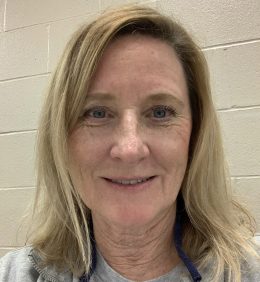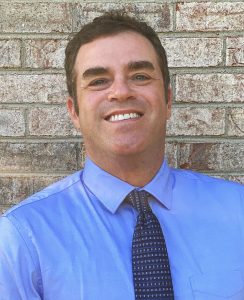Two graduates of Wright State University’s teacher education program have been named finalists for the 2021 Ohio Teacher of the Year.
Joy McKarns, an eighth-grade language arts teacher at Northmont Middle School, and Tom Jenkins, who teaches eighth-grade science and STEM at Greenon Junior/Senior High School, were two of the four teachers named finalists by the Ohio Department of Education.
Joy McKarns ’93
“This is a great honor because I get to represent the hardest most dedicated people on the planet — teachers,” McKarns said of being named a finalist.
McKarns earned her master’s degree in education from Wright State in 1993. As a student at Wright State, she said, she engaged with “some incredible peers and had some outstanding opportunities to work in the field to gain some impactful experience.”
Over her 28-year education career, she has taught all grade levels from seven to 12. She approaches teaching by looking at things from a student’s point of view. Her approach has been especially helpful over the last few weeks as McKarns and her fellow teachers have deconstructed teaching and reassembled it online, she said.
“Teaching during the pandemic has literally flipped our worlds upside down,” she said.
One of her favorite moments during the pandemic occurred when she baked muffins with a student while they worked together on an assignment during a Google Meet.
“I believe the work has been harder than ever but more rewarding in that I am able to work with kids on an individual basis more than ever before,” she said.
McKarns partners with the Dayton Heritage Historical Aviation National Parks to teach students from around the Miami Valley about the birthplace of aviation.
“I believe that connecting my students to the history of Dayton is one of the most engaging things I do,” she said. “I want students to be inspired by their heritage and go out and change the world just like the Wright brothers did.”
McKarns is a recipient of the 2020 Henry Ford Innovative Teacher Grand Prize Award, which recognizes educators who use the classroom to inspire innovation, creativity, problem solving and critical thinking among their students. As an instructor for Air Camp USA, she helps inspire students from all over the country in STEM opportunities using aviation as a theme.
Tom Jenkins ’97, ’99
Jenkins said it was an amazing honor to be named a Teacher of the Year finalist.
“To be a finalist in a state with so many amazing educators validates all of the work that I have invested into improving my practice,” he said. “It lets me know that my community appreciates my efforts.”
Jenkins earned his bachelor’s degree in elementary education with a science concentration in 1997 and a master’s degree in science teaching in 1999 from Wright State.
As a first-generation college student from Springfield, Jenkins was attracted to Wright State because it offered a quality institution where he could commute for classes.
He praised earth and environmental science faculty members William Slattery and Stacey Hundley and chemistry faculty member Suzanne Lunsford for offering experiential courses that greatly influenced his problem-based teaching style.
Jenkins approaches teaching from a pragmatic perspective, helping his students prepare both for the challenges that lie in front of them and for a wide range of professions. In his science and STEM classes, Jenkins emphasizes the engineering design process in which the goal is to improve with each iteration rather than obtaining perfection.
“I want my students to appreciate that failure is a natural part of learning and that improving via correcting past mistakes will help them be more successful in the future,” he said.
For Jenkins, teaching during the coronavirus pandemic has been the most challenging time of his career. He struggled in the spring to balance his project-based lessons with what his students could actually accomplish while working from home.
A highlight of the term was an experiment his students designed for Stratostar that was launched to an altitude of over 93,000 feet. “The ‘Space Mentos’ experiments were a wonderful way to finish a difficult spring quarter,” Jenkins said.
Jenkins is excited to return to teaching his students in-person this fall. Though Jenkins must safely manage labs and group projects, he said, “it’s an amazing feeling to be back in the classroom with my students. Things will definitely be different, but I have every confidence that I will still be able to create memorable experiences for my students.”
Jenkins has been a NASA SOFIA airborne astronomy ambassador, NOAA teacher at sea, a teaching fellow at the Johns Hopkins Whiting School of Engineering at Clark State University and a lead instructor at Air Camp.



 Wright State student-athletes make a lasting impact on local family, more to come
Wright State student-athletes make a lasting impact on local family, more to come  Wright State names Rajneesh Suri dean of Raj Soin College of Business
Wright State names Rajneesh Suri dean of Raj Soin College of Business  ‘Only in New York,’ born at Wright State
‘Only in New York,’ born at Wright State  Wright State president, Horizon League leaders welcome new commissioner
Wright State president, Horizon League leaders welcome new commissioner  Wright State celebrates homecoming with week-long block party
Wright State celebrates homecoming with week-long block party 